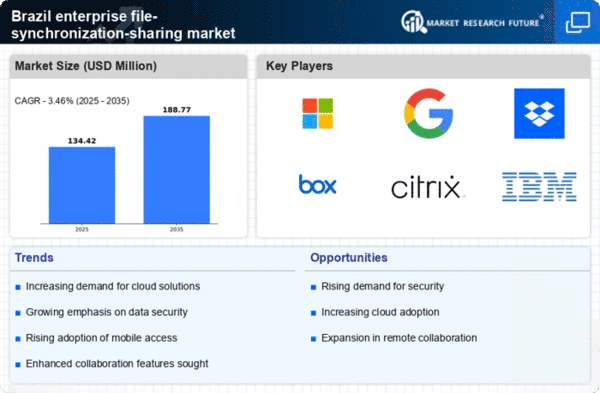Emergence of Mobile Workforce Trends
The rise of mobile workforce trends in Brazil is reshaping the enterprise file-synchronization-sharing market. With an increasing number of employees working remotely or on-the-go, the demand for mobile-friendly file-sharing solutions is on the rise. In 2025, it is projected that 70% of Brazilian workers will require access to files via mobile devices, highlighting the necessity for synchronization tools that cater to this mobile-centric approach. This trend suggests that providers must prioritize mobile compatibility and user experience in their offerings, ensuring that employees can efficiently collaborate and share files regardless of their location.
Expansion of Cloud Computing Adoption
the enterprise file-synchronization-sharing market in Brazil witnessed a significant expansion due to the growing adoption of cloud computing technologies. As organizations migrate to cloud-based infrastructures, the need for effective file synchronization and sharing solutions becomes increasingly critical. In 2025, it is estimated that over 80% of Brazilian enterprises will utilize cloud services, creating a fertile ground for the growth of the enterprise file-synchronization-sharing market. This trend indicates a shift towards more scalable and flexible solutions, prompting providers to enhance their cloud integration capabilities to meet the demands of businesses embracing cloud technologies.
Rising Demand for Remote Work Solutions
the enterprise file-synchronization-sharing market in Brazil experienced a notable surge in demand for remote work solutions. As organizations increasingly adopt flexible work arrangements, the need for secure and efficient file-sharing systems becomes paramount. In 2025, it is estimated that approximately 60% of Brazilian companies will implement remote work policies, driving the necessity for robust synchronization tools. This trend indicates a shift towards digital collaboration, where employees require seamless access to files from various locations. Consequently, providers in the enterprise file-synchronization-sharing market must enhance their offerings to cater to this evolving landscape, ensuring that security and accessibility are prioritized.
Growing Regulatory Compliance Requirements
Brazilian enterprises face stringent regulatory compliance requirements, particularly concerning data protection and privacy. The General Data Protection Law (LGPD) mandates that organizations implement adequate measures to safeguard personal data. This regulatory environment propels the enterprise file-synchronization-sharing market, as companies seek solutions that not only facilitate file sharing but also ensure compliance with legal standards. In 2025, it is projected that 75% of businesses will prioritize compliance features in their file-sharing solutions. This trend underscores the importance of integrating compliance capabilities into enterprise file-synchronization-sharing tools, thereby enhancing their appeal to organizations navigating complex regulatory landscapes.
Increased Investment in Digital Transformation
Brazilian companies are increasingly investing in digital transformation initiatives, which significantly impacts the enterprise file-synchronization-sharing market. As organizations strive to modernize their operations, the demand for advanced file-sharing solutions rises. In 2025, it is anticipated that investments in digital technologies will reach $50 billion, with a substantial portion allocated to enhancing collaboration tools. This trend suggests that enterprises are recognizing the value of efficient file synchronization and sharing as integral components of their digital strategies. Consequently, providers in the market must innovate and adapt their offerings to align with the evolving needs of businesses undergoing digital transformation.
















